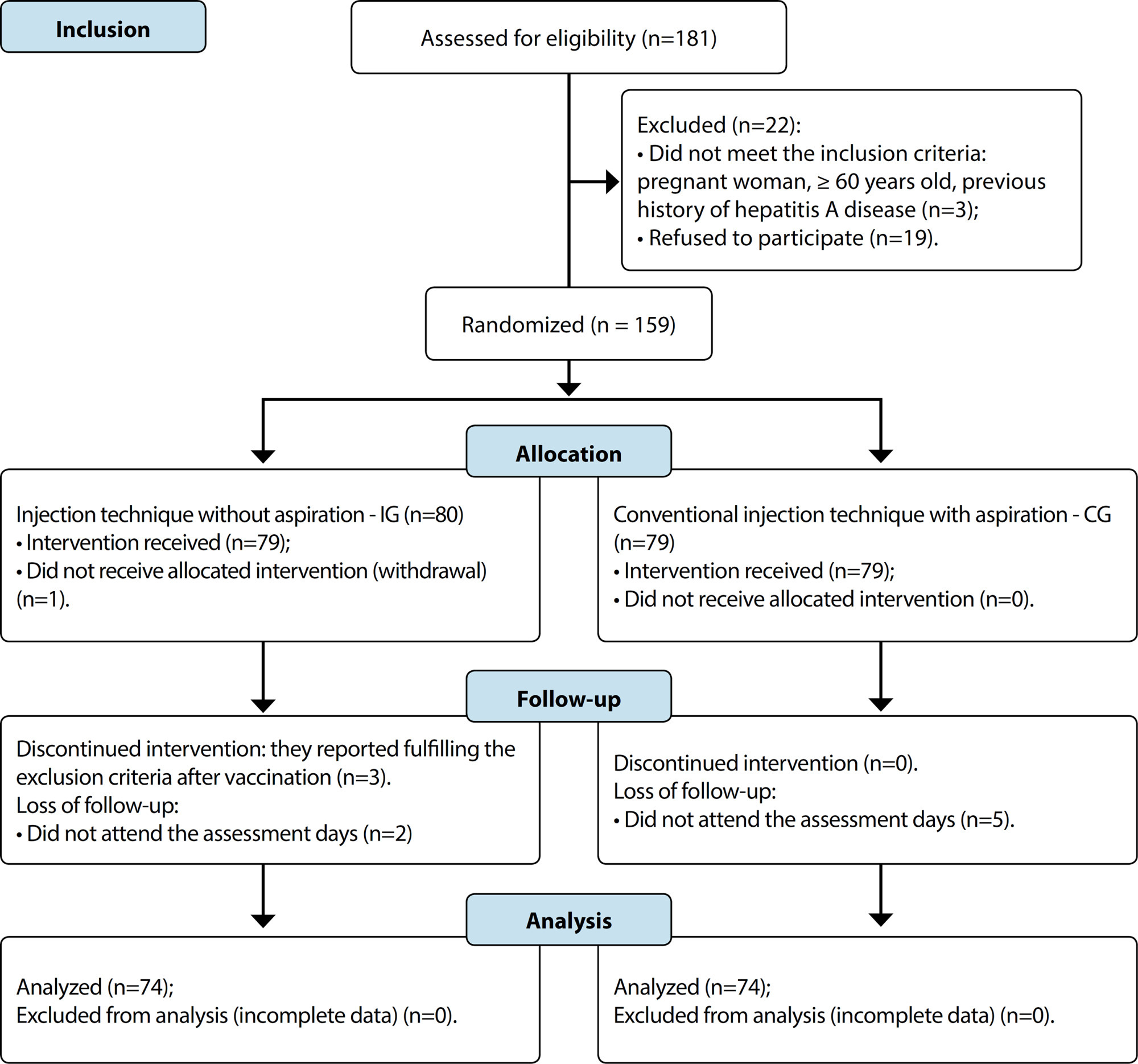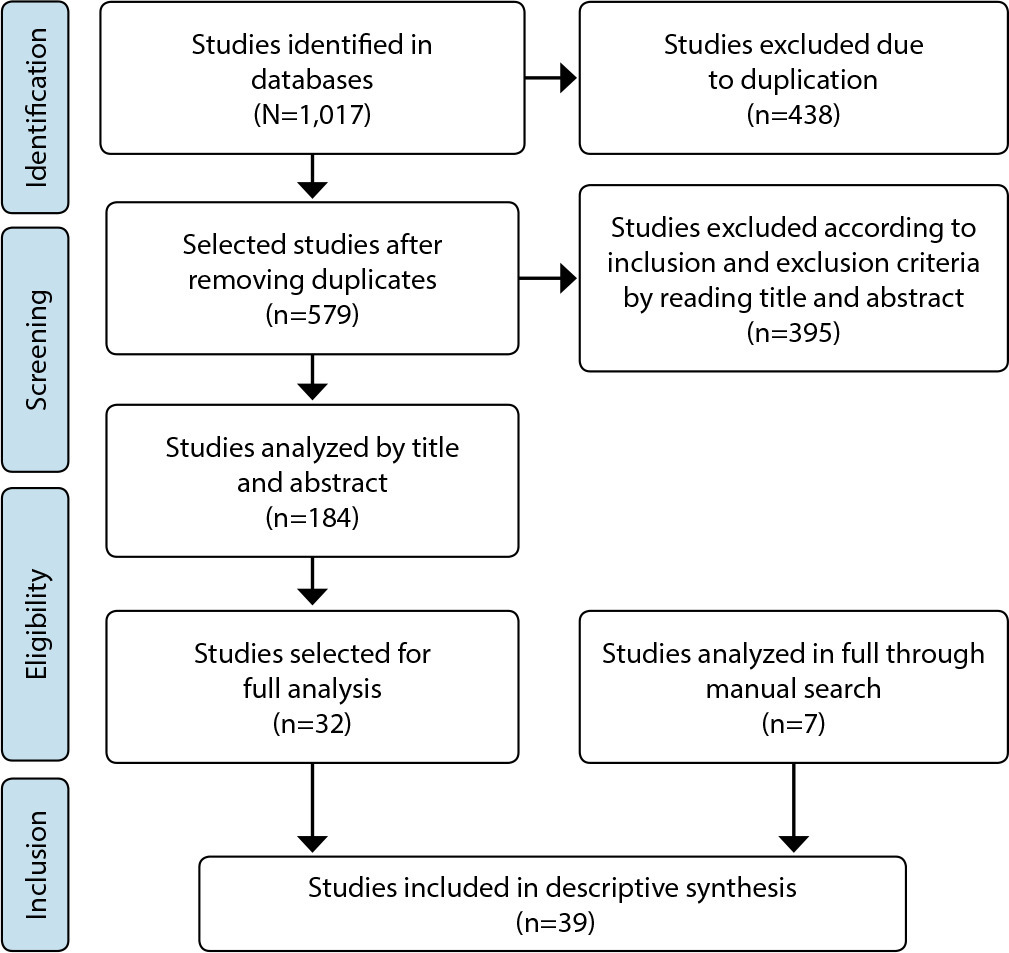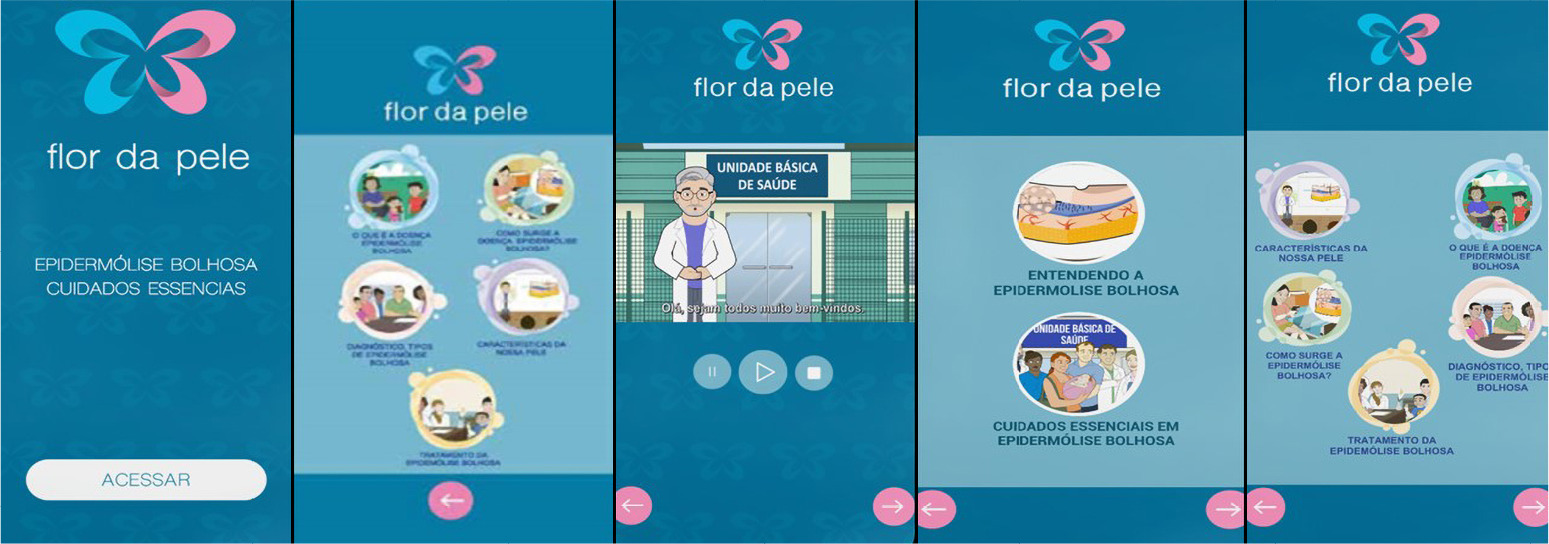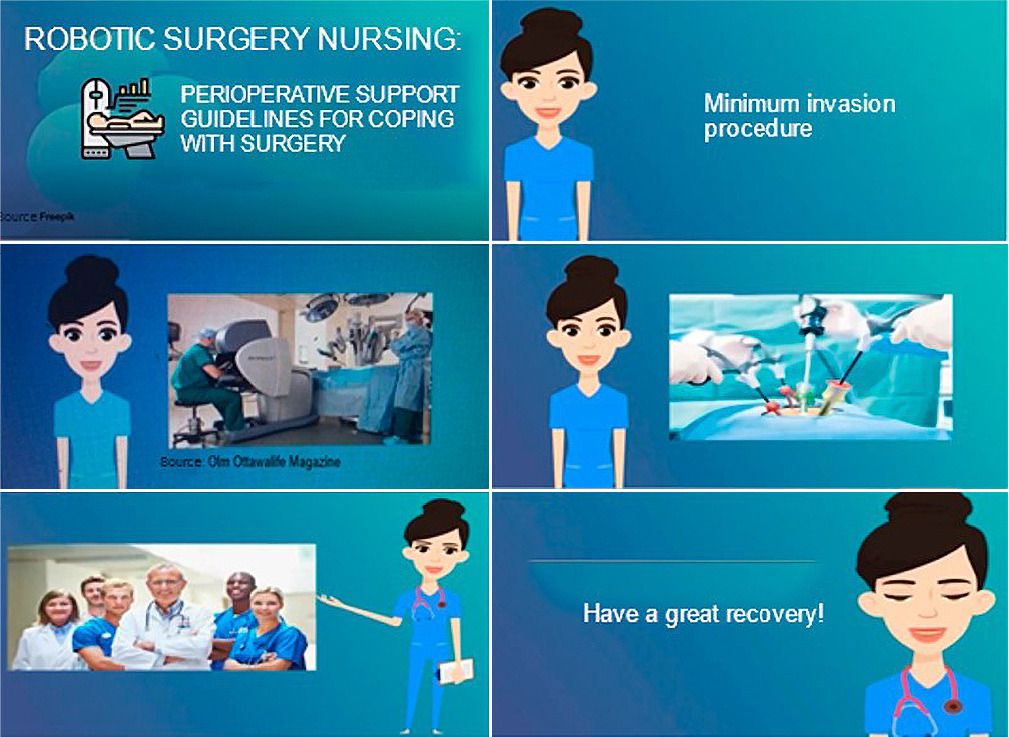-
EXPERIENCE REPORT08-20-2022
Advanced training and international educational exchange: learning, overcoming and experiences
Revista Brasileira de Enfermagem. 2022;75(1):e20200841
Abstract
EXPERIENCE REPORTAdvanced training and international educational exchange: learning, overcoming and experiences
Revista Brasileira de Enfermagem. 2022;75(1):e20200841
DOI 10.1590/0034-7167-2020-0841
Views0See moreABSTRACT
Objectives:
to report my experiences as a researcher during the course of advanced post-doctoral training abroad.
Methods:
theoretical and methodological option for Max van Manen’s phenomenology of practice. The activities were developed in the Health Sciences Research Unit: Nursing, in Portugal, Université Catholique de Louvain, in Belgium, and in Escuela de Enfermería y Fisioterapia de la Universidad de Castilla-La Mancha, in Spain.
Results:
participating in a multicenter international research project enabled the acquisition of new scientific knowledge, personal and cultural gains. From a broader perspective, the international graduate and undergraduate nursing networks were strengthened through the mobility of researchers, and overcoming of the “status quo” by the formation of a critical mass environment indispensable for scientific advancement.
Final Considerations:
sharing the experience that you appropriate is about the power of grasping possibilities of a practical experience, in the context of the world, and going through it, motivated by the desire to make internationalization feasible.
-
ORIGINAL ARTICLE08-20-2022
Religious/spiritual experiences, quality of life and satisfaction with life of hospitalized octogenarians
Revista Brasileira de Enfermagem. 2022;75(1):e20201099
Abstract
ORIGINAL ARTICLEReligious/spiritual experiences, quality of life and satisfaction with life of hospitalized octogenarians
Revista Brasileira de Enfermagem. 2022;75(1):e20201099
DOI 10.1590/0034-7167-2020-1099
Views0See moreABSTRACT
Objectives:
to assess quality of life (QoL) and satisfaction with life (SWL) indices and verify whether the frequency of religious and spiritual experiences is associated with QoL and SWL in hospitalized octogenarians.
Method:
this is a cross-sectional study, with 128 octogenarians. World Health Organization QoL instruments and Scales applied: Daily Spiritual Experience (DSES) and Satisfaction With Life (SWLS).
Results:
more committed domains related to QoL and SWL: autonomy and physical capacity. The higher the score in DSES, the higher the scores in the psychological domains and past, present, and future QoL activities. The higher the score in DSES, the higher the score in the social involvement aspect.
Conclusion:
the results of this study showed that the higher frequency of religious and spiritual experiences of hospitalized elderly people was associated with better QoL and SWL. It is emphasized that religious and spiritual experiences should be explored in the hospital therapeutic context.
-
ORIGINAL ARTICLE08-20-2022
Intramuscular injection safety without aspiration in the ventro-gluteal region during vaccination: randomized clinical trial
Revista Brasileira de Enfermagem. 2022;75(1):e20201119
Abstract
ORIGINAL ARTICLEIntramuscular injection safety without aspiration in the ventro-gluteal region during vaccination: randomized clinical trial
Revista Brasileira de Enfermagem. 2022;75(1):e20201119
DOI 10.1590/0034-7167-2020-1119
Views0See moreABSTRACT
Objectives:
to compare adverse events after administrating hepatitis A vaccine intramuscularly in the ventro-gluteal region between techniques with and without aspiration.
Methods:
randomized double-blind clinical trial, using hepatitis A vaccine (inactivated) in the ventro-gluteal region, with a sample of 74 participants in the intervention group, vaccinated with the slow injection technique without aspiration, and 74 participants in the control group undergoing slow injection with aspiration. Daily assessment of participants was carried out in the 72 hours after vaccination, in order to ascertain local, systemic adverse events, local and contralateral temperatures.
Results:
the occurrence of local and systemic adverse events was homogeneous between the groups in the three days after vaccination (p>0.05). There was no influence of sex, race, pre-existing disease and use of medication.
Conclusions:
the intramuscular vaccination technique without aspiration in the ventro-gluteal region is safe for adverse events following immunization compared to the conventional technique with aspiration.

-
REVIEW08-15-2022
State of the art on Advanced Nursing Practice: reflections for the agenda in Brazil
Revista Brasileira de Enfermagem. 2022;75(5):e20220151
Abstract
REVIEWState of the art on Advanced Nursing Practice: reflections for the agenda in Brazil
Revista Brasileira de Enfermagem. 2022;75(5):e20220151
DOI 10.1590/0034-7167-2022-0151
Views0See moreABSTRACT
Objectives:
to review the state of the art on Advanced Nursing Practices.
Methods:
a scoping review of existing publications up to 2020, in the PubMed/MEDLINE, SciELO, LILACS, BDENF, Web of Science and Scopus databases, identified by descriptors “Prática Avançada de Enfermagem” or “Advanced Practice Nursing”. A total of 184 documents were selected. The characterization of this study was carried out, followed by the construction of an overview of different regions of the world.
Results:
studies showed an increasing trend in the last decade, being present in all continents, although 43.5% correspond to opinion articles, comments, editorials and event reports. Even with similar aspects, the justifications for Advanced Nursing Practices reflect specific regional needs.
Final Considerations:
the studies still lack methodological variety and emphasis on the specificities of countries and their health systems, in addition to greater detail on labor regulation, professional training and the impacts of these practices in nursing.

-
ORIGINAL ARTICLE08-15-2022
Development and validation of educational hypermedia for family members and caregivers of people with epidermolysis bullosa
Revista Brasileira de Enfermagem. 2022;75(5):e20210856
Abstract
ORIGINAL ARTICLEDevelopment and validation of educational hypermedia for family members and caregivers of people with epidermolysis bullosa
Revista Brasileira de Enfermagem. 2022;75(5):e20210856
DOI 10.1590/0034-7167-2021-0856
Views0See moreABSTRACT
Objectives:
to develop educational hypermedia to support the care of people with epidermolysis bullosa; and validate its content, functionality, usability, and efficiency.
Methods:
methodological study, based on five phases: analysis and planning; modeling; implementation; evaluation; and distribution. Hypermedia was evaluated by expert judges, using the content validity index, index of agreement, and exact binomial distribution test, considering p > 0.05 and 0.80 agreement ratio to estimate the statistical reliability of CVI and IOA.
Results:
in the validation with the judges, hypermedia presented excellent indices of total content validity (CVIt=0.99) and agreement for functionality, usability, and efficiency (IOA=100%), with p > 0.05 in all evaluated items.
Conclusions:
the developed hypermedia was considered adequate, with good screens, descriptions, and animations, presenting itself clearly and objectively to be used by patients with epidermolysis bullosa and their family members/caregivers.

-
ORIGINAL ARTICLE08-15-2022
Reiki for promotion of health and sleep quality in hospital nursing professionals
Revista Brasileira de Enfermagem. 2022;75(5):e20210535
Abstract
ORIGINAL ARTICLEReiki for promotion of health and sleep quality in hospital nursing professionals
Revista Brasileira de Enfermagem. 2022;75(5):e20210535
DOI 10.1590/0034-7167-2021-0535
Views0See moreABSTRACT
Objectives:
to know the repercussions of a Reiki therapy intervention on the sleep quality of nursing professionals working in a general hospital.
Methods:
a qualitative-quantitative study conducted with 16 professionals from the nursing team of a hospital in northwest Paraná, who participated in an intervention consisting of six weekly Reiki sessions. Data collected from September, 2019 to March, 2020 through semi-structured interviews and application of the Pittsburgh Sleep Quality Index before and after the intervention.
Results:
better sleep quality, characterized by a reduction in the time to fall asleep and in nightmares, and an increase in sleeping hours.
Conclusions:
reiki intervention had a positive impact on the sleep quality of participants.
-
ORIGINAL ARTICLE08-15-2022
Construction and validation of an educational video for patients in the perioperative period of robotic surgery
Revista Brasileira de Enfermagem. 2022;75(5):e20210952
Abstract
ORIGINAL ARTICLEConstruction and validation of an educational video for patients in the perioperative period of robotic surgery
Revista Brasileira de Enfermagem. 2022;75(5):e20210952
DOI 10.1590/0034-7167-2021-0952
Views1See moreABSTRACT
Objectives:
to build and validate educational technology, of the video type, aimed at teaching about the perioperative period of robotic surgery.
Methods:
methodological development study, following the integrative review phases: pre-production, production, post-production, and validation. The video was evaluated for content and appearance by 14 judges. Content validity (CVI) and appearance (AVI) and agreement (CI) indices were calculated, and the exact binomial test was applied, considering p>0.05 and a proportion of 0.80 of agreement.
Results:
the video included 13 themes, with a duration of seven minutes and 33 seconds. The items of the three dimensions evaluated presented excellent CVI, ranging between 0.86 and 1.00 (p>0.05), with a total CVI of 0.95, VAT of 0.94 and CI equal to 61.5%.
Conclusions:
the video included 13 themes, with a duration of seven minutes and 33 seconds. The items of the three dimensions evaluated presented excellent CVI, ranging between 0.86 and 1.00 (p>0.05), with a total CVI of 0.95, VAT of 0.94 and CI equal to 61.5%.

-
ORIGINAL ARTICLE08-08-2022
Health literacy and adherence to the pharmacological treatment by people with arterial hypertension
Revista Brasileira de Enfermagem. 2022;75(6):e20220008
Abstract
ORIGINAL ARTICLEHealth literacy and adherence to the pharmacological treatment by people with arterial hypertension
Revista Brasileira de Enfermagem. 2022;75(6):e20220008
DOI 10.1590/0034-7167-2022-0008
Views0See moreABSTRACT
Objective:
To analyze the association between health literacy and the adherence to the pharmacological treatment of Brazilians with arterial hypertension.
Methods:
Cross-sectional study with 234 participants who responded an on-line sociodemographic and clinical characterization questionnaire, in addition to evaluation of health literacy and of the adherence to their pharmacological treatment. Data were analyzed using descriptive statistics and difference and correlation tests.
Results:
People with post-graduation, who were actively working and did not smoke, had better health literacy results. Elders and those who were retired or lived on government subsidies adhered better to the medication treatment. There was a correlation between the numerical dimension (rs=0.189; p=0.004) and the global health literacy result (r2=0.170; p=0.009) with the adherence.
Conclusions:
A better numerical and global understanding of health literacy was associated with better adherence to arterial hypertension medication treatment.
-
EXPERIENCE REPORT01-01-2017
Focus group on qualitative research: experience report
Revista Brasileira de Enfermagem. 2017;70(2):424-429
Abstract
EXPERIENCE REPORTFocus group on qualitative research: experience report
Revista Brasileira de Enfermagem. 2017;70(2):424-429
DOI 10.1590/0034-7167-2016-0091
Views1See moreABSTRACT
Objective:
to report the experience of applying the focus group technique for production of data in qualitative research.
Method:
four group sessions were held from May to June 2015, with the participation of professionals from the public sector of PHC and from specialized service.
Results:
the way focus group was developed is described in steps: planning, recruitment, ambience, group sessions, and evaluation.
Conclusion:
we highlight that the focus group, as a technique to produce data in collective space, can contribute not only to the construction of knowledge in Nursing, but also to the research approach with the assistance practice.

-
RESEARCH01-01-2017
Guide of attributes of the nurse’s political competence: a methodological study
Revista Brasileira de Enfermagem. 2017;70(3):526-534
Abstract
RESEARCHGuide of attributes of the nurse’s political competence: a methodological study
Revista Brasileira de Enfermagem. 2017;70(3):526-534
DOI 10.1590/0034-7167-2016-0483
Views0See moreABSTRACT
Objective:
To build and validate a guide of attributes of the nurse’s political competence.
Method:
Methodological research. This study comprised the construction of the instrument through literature review; experts validation of pre-established attributes for composing the guide; and clinical validation in the nurses work environment/reality. The data collection took place in the months from August to October 2014, and the analysis was based on the content analysis of Bardin and use of Epi info 3.5. All ethical precepts have been complied with.
Results:
From 29 attributes found in the literature, 25 have been validated by experts. Clinical/practical validation involved the participation of 43 nurses, who observed that the attributes are not articulated with the professional practices developed by them.
Conclusion:
The attributes of the nurse’s political competence were identified with support of literature. It is concluded that the professionals still have limited and fragmented perception of political competence, expressing difficulty/limitation.
-
ORIGINAL ARTICLE11-26-2022
Vulnerability and quality of life of older persons in the community in different situations of family care
Revista Brasileira de Enfermagem. 2022;75:e20210034
Abstract
ORIGINAL ARTICLEVulnerability and quality of life of older persons in the community in different situations of family care
Revista Brasileira de Enfermagem. 2022;75:e20210034
DOI 10.1590/0034-7167-2021-0034
Views0See moreABSTRACT
Objective:
to correlate socio-contextual aspects, physical vulnerability and quality of life of older persons in the community in different situations of family care.
Methods:
epidemiological, a cross-sectional and analytical study, with elderly people in the community (n=769), with application of the instruments: Vulnerable Elders Survey-13 (VES-13), World Health Organization Quality of Life for Older Persons (WHOQOL-OLD) and the World Health Organization Quality of Life (WHOQOL-BREF); and socio-contextual data questionnaire.
Results:
the population assessed presented an average of regular quality of life in both the WHOQOL-BREF and the WHOQOL-OLD. Older non-vulnerable persons (62.2%) and those with close family contact (82.6%) have a better quality of life than the vulnerable (p<0.0001).
Conclusion:
lower quality of life scores and more distant families are related to vulnerable elderly people; thus, the assessment of family proximity and physical vulnerability of older persons is shown to be an important factor in improving quality of life.
-
ORIGINAL ARTICLE10-09-2023
Independent and combined effects of lifestyle behaviors on adolescent health-related quality of life
Revista Brasileira de Enfermagem. 2023;76(4):e20220780
Abstract
ORIGINAL ARTICLEIndependent and combined effects of lifestyle behaviors on adolescent health-related quality of life
Revista Brasileira de Enfermagem. 2023;76(4):e20220780
DOI 10.1590/0034-7167-2022-0780
Views0See moreABSTRACT
Objective:
To investigate the independent and combined effects of lifestyle behaviors, including physical activity, sedentary behavior, sleep duration and food intake, in the health-related quality of life (HRQoL) of Brazilian adolescents.
Methods:
Cross-sectional school-based study, with the participation of 306 adolescents aged 14 to 18 years. A questionnaire was applied with structured questions to collect lifestyle behaviors data. Perception of the HRQoL was identified using the Kidscreen-27. The study used covariance analysis and linear regression models for statistical analysis.
Results:
Adolescents who reported ≤ 2 hours/day of screen-based sedentary behavior and sleep duration equivalent to 8-10 hours/night presented significantly higher HRQoL. Adolescents who reported joint adherence ≥ 3 healthy lifestyle behaviors demonstrated approximately two [OR=2.12] to three times [OR=3.04] more chance of presenting higher perceptions of HRQoL.
Conclusion:
Although healthy lifestyle behaviors had a positive independent effect on HRQoL, joint adherence to healthy behaviors enhances the cumulative effect.

-
ORIGINAL ARTICLE12-04-2023
Social representation of spiritual surgeries in Umbanda: culture, religion and contributions of nursing theory
Revista Brasileira de Enfermagem. 2023;76(6):e20220787
Abstract
ORIGINAL ARTICLESocial representation of spiritual surgeries in Umbanda: culture, religion and contributions of nursing theory
Revista Brasileira de Enfermagem. 2023;76(6):e20220787
DOI 10.1590/0034-7167-2022-0787
Views1See moreABSTRACT
Objective:
to analyze the social representation of spiritual surgeries in Umbanda for Bantu-Amerindian ritual mediums and their contributions to the cross-cultural care proposed by Madeleine Leininger.
Methods:
a descriptive-exploratory, qualitative study, supported by the procedural approach of Social Representation Theory and Transcultural Nursing Theory, carried out with 30 Umbanda mediums of the Bantu-Amerindian ritual through interviews, submitted to the Iramuteq software for lexical analysis.
Results:
mostly women, white, with an average of 46 years old and approximately 14 years of practice in Umbanda participated. The social representation of spiritual surgeries in Umbanda is objectified and anchored through a biomedical vision of care, encompassing a set of beliefs, values and practices as religious treatments, through faith, whose main objective is healing.
Final considerations:
spiritual surgeries are a form of transcultural care, according to Madeleine Leininger’s propositions, as they integrate the culture of a group through health care in Umbanda.

-
ORIGINAL ARTICLE05-29-2023
Quality of life from women’s perspective in the exercise of sex work: a study of social representations
Revista Brasileira de Enfermagem. 2023;76:e20220169
Abstract
ORIGINAL ARTICLEQuality of life from women’s perspective in the exercise of sex work: a study of social representations
Revista Brasileira de Enfermagem. 2023;76:e20220169
DOI 10.1590/0034-7167-2022-0169
Views1See moreABSTRACT
Objectives:
to analyze the social representations elaborated by sex workers from Alto Sertão Produtivo Baiano about quality of life.
Methods:
a qualitative study, based on the Social Representation Theory, carried out in the region of Alto Sertão Produtivo Baiano, with 30 sex workers. Individual in-depth interview was carried out, with speeches organized in a corpus and treated in IRAMUTEQ, enabling lexical analysis for Descending Hierarchical Classification.
Results:
four thematic classes emerged, in which social representations of quality of life pervade: money earned to supply needs; association with healthy living and obtaining health (physical and mental); balance of emotions (although there are some negative sensations such as fear and anxiety); and faith in a deity.
Final Considerations:
the social representations elaborated by sex workers about quality of life are anchored in concepts, subjective and practical, punctuated by the World Health Organization.

-
ORIGINAL ARTICLE05-29-2023
Violence in rural areas against disabled people from the perspective of their families
Revista Brasileira de Enfermagem. 2023;76:e20220404
Abstract
ORIGINAL ARTICLEViolence in rural areas against disabled people from the perspective of their families
Revista Brasileira de Enfermagem. 2023;76:e20220404
DOI 10.1590/0034-7167-2022-0404
Views0See moreABSTRACT
Objectives:
to know the violence spoken and felt by disabled people, living in rural areas, from the perspective of their families.
Methods:
a descriptive-exploratory and qualitative study, carried out in four municipalities in Rio Grande do Sul, Brazil. Twelve family members who lived with disabled people in rural areas participated. Data were collected through semi-structured interviews and analyzed using thematic content analysis.
Results:
disabled people, living in rural areas, experienced physical, psychological and sexual violence, perpetrated by family members, colleagues, community members and health professionals. Adaptations were mentioned in family dynamics for the care of disabled people, social, financial and leisure impacts, and challenges in access and accessibility to education and health services.
Final Considerations:
violence against this population manifests itself in a reality with socioeconomic and family particularities, marked by exclusion, disrespect and denial of rights and access to fundamental goods and services.

-
ORIGINAL ARTICLE12-08-2023
Care for older adults with disabilities in Long Term Care Facility
Revista Brasileira de Enfermagem. 2023;76:e20220767
Abstract
ORIGINAL ARTICLECare for older adults with disabilities in Long Term Care Facility
Revista Brasileira de Enfermagem. 2023;76:e20220767
DOI 10.1590/0034-7167-2022-0767
Views0See moreABSTRACT
Objective:
to analyze the constitution of care offered to older adults with disabilities, from Long Term Care Facility professionals’ perspective.
Methods:
this is a discourse analysis based on the post-structuralist framework. Participants in this study are professionals involved in the care for older adults, totaling 14 respondents, 13 women and one man.
Results:
from professionals’ perspective, there is a fine line between caring for older adults with disabilities and maintaining their autonomy. Care in which autonomy is restricted predisposes older adults to a process of dependency.
Final considerations:
caring for older adults with disabilities constitutes the challenge between caring and maintaining independence. Thus, older adult-centered care should be taken as a premise so that their individualities are respected.
Search
Search in:
Nuvem de Tags
Adolescente (85) Atenção Primária à Saúde (239) COVID-19 (91) Criança (91) Cuidados de Enfermagem (269) Educação em Enfermagem (151) Educação em Saúde (139) Enfermagem (930) Enfermagem Pediátrica (86) Estudantes de Enfermagem (77) Estudos de Validação (131) Família (87) Idoso (208) Promoção da Saúde (99) Qualidade de Vida (104) Saúde do Trabalhador (86) Saúde Mental (145) Saúde Pública (82) Segurança do Paciente (150) Tecnologia Educacional (100)



